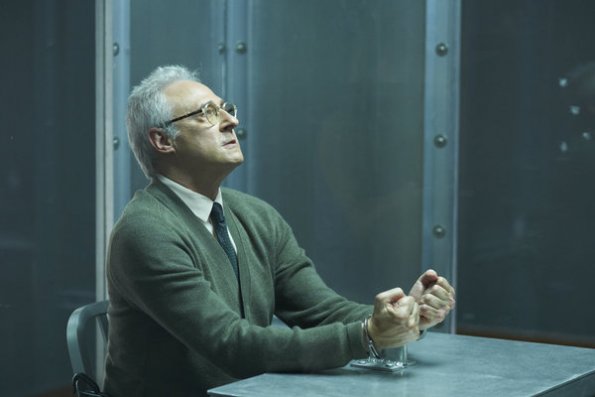"Blind Spot" showed many glimpses of the episode it could have been, and it did something extremely well throughout the hour: It made us forget we never left the confinement of our heroes' small headquarters. The episode showcased a multilayered story, which introduced fascinating new Alpha abilities and put a fan-favorite character at the heart of the events, resulting in a plot that kept the viewer interested in spite of its shortcomings.
The premise of this story was as good as it gets: Dr. Kern, a suspected Alpha, is abducted by Dr. Rosen's team for a definitive assessment, but it seems he has brought something else with him... It set the story up for some excitements, which we had in spades. The writers avoided some of the usual pitfalls and did not toy with us as much as they could have. They maintained for a very short while the possibility of any connection between the invisible entity and Kern, and for an even shorter while, a possibility of collusion between the two. Also, as soon as Griffin (the invisible woman) got close to Rachel, her presence was felt. This was obviously the queue for the slow viewer to pick up on one important consequence for the story: Rachel and, to some degree, Gary were the best equipped to detect the intruder. And of course, a lot of Rachel or Gary is always a good thing for Alphas.

It is always irritating when characters stubbornly refuse to see, hear or do things just to serve the plot, so it was refreshing to see Rachel on Griffin's trail as soon as she exposed herself. Those scenes made sense and weren't designed to keep the tracking going on forever. Given Rachel's ability, the viewer knew – and the invisible woman soon realized – that it was just a matter of time before she was cornered. And something else done right was the degree of helplessness depicted in Rachel wandering alone in the hallway (and for that matter, in Gary frantically waving his DCIS card around) that could not have been achieved with the other members of the team (not even with Nina).
The story also did well with the initial interactions with Dr. Kern and the way he brought up Red Flag, making his point about the Alpha-ability-inhibitor drug, and helping to educate the team (and us) on Alphas like Griffin. Things went south in this storyline when the writers decided to go against most of what we had seen so far and make Griffin into the lesser evil. Surprising the viewer is all good, but here it came with a price. Because of the way Kern had acted until then, writers had no choice but to turn him into a sort of caricature of himself. It should be said to their defense that even considering Cameron's serious injury, it was obvious Griffin wasn't out to kill Dr. Rosen's Alphas. Plus, the final showdown allowed Bill to get back his power in a way that made sense, and pushed the story forward with the "Stanton Parish" comment from Griffin. Kern, as a believer, would not have been much helpful to the team.
On the chapter of things that did not shine, the relationship between Cameron and Nina is a distraction that brings nothing to the story. A show doesn't have to include romance, especially if it can't be done right and doesn't fit in nicely. Also, why couldn't they just knock Kern off when they first saw the cracks on the walls? Why take the time to stitch up Cameron? People who yell at the screen in the theater (and deserve to go to a special place in hell) occasionally have a point...

Like many things involving Bill, the storyline about his power was interesting and well written. As usual, his character was very abrasive, which is something that seems to affect everyone except Dr. Rosen. And when I say everyone, it's including the viewer. The loss of power is a required stop in any superhero story, and here it was done much better than it often is. It was amusing to touch on the fact that although superheroes always claim they don't want their powers anymore after they lose them, there are always the nonverbal signs that seem to say otherwise. As the story developed, it was clear Bill missed his strength in more ways than one. It was smart to put him in a situation where he needed his ability, instead of returning his power to him because of some cosmic or karmic reason. Plus, the correlation between his ability and his emotions was neatly reinforced.
That of course leads us to the new powers of the week. The show continues with its uncanny ability to come up with fascinating superpowers and, maybe the most important detail for me, to stay true to some basic principles governing those abilities. Rosen's pseudo-science was again right on the mark here and successfully tied both powers to the nervous system. Following that analysis to conclude that cameras should record the person exploiting the human "Bling Spot" was neat.
In spite of a few shortcomings, this episode was masterfully put together in terms of structure and intensity, which is why the fact that we spent the whole hour in a few rooms on the same floor never registered as an issue.